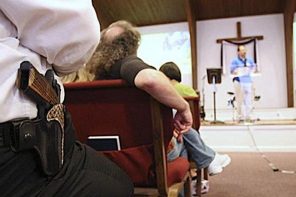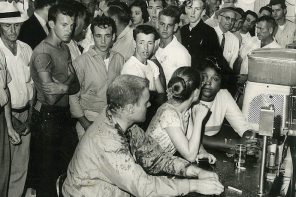It’s not clear when again, if ever, a presidential address to both houses of Congress and the beginning of the Christian sacred season known as Lent will coincide during a time of economic collapse. As a Christian and as someone whose hope for this President and this country still burns bright, I want to make the most of the unusual convergence.
The grey dawn that follows every Fat Tuesday blowout leaves no doubt that the party is over. But we know that. The issue is always what we will choose to make of it.
Our national binge—our now-departed Fat Tuesday in America—lasted for a relatively long time. Yet never has the expression “house of cards” been more appropriate. For it was the bizarre idea that everyone—anyone—could own real property absent real assets that finally collapsed the whole thing to a shambles.
By now we know all too much about how the American dream of home ownership was milked and manipulated by Wall Street hustlers to create a genuine American nightmare. My aim here is not to rehearse the sordid history of what brought us down but rather to explore what it means to be down on the ground.
The significance of Ash Wednesday is to remind us that it’s totally okay to be down on the ground. “Remember that you are dust,” is what the priest or minister says as she or he makes the sign of the cross on one’s forehead. The significance of Lent is to teach us humility and to teach us gratitude for the gifts we have rather than lusting for things we do not have. Our English word “humility” comes from the Latin root humilis, meaning of or near to dirt, to humus. There’s an important clue here to what will renew our health, both individually and collectively. There’s a grace to be found near to the earth and in remembrance that we ourselves are of the earth.
I am listening closely to Obama’s speech as I write this, and I am sorry to say that I am missing any signal from him that we can return to real health only by following a different kind of path to a different kind of recovery. When the President boasted that America will be “back” economically, I wondered what he meant. Because I really don’t think we can afford to go back to the kind of economy we had during the house of cards period: an economy based on overwork, overconsumption, and unlimited credit/unlimited debt. We may indeed be a country that “never quits,” but my Lenten question is whether there are significant aspects of our way of life that we really should quit, and not just for a symbolic 40 days.
Benjamin Barber has it exactly right when he argues that this humbling moment calls for a revolution of the spirit, a “wholesale rethinking of the dominant role of the market in our society.” Barber understands that in order to recover we need to revive consumer spending. But Barber suggests that we might aim to make future consumer spending just 50% of GDP, a level equivalent to the level in Germany, rather than the 70% it has been in the United States.
For us a genuine spiritual revolution need not be a Teutonic killjoy revolution—a mere taking away of the goodies that people now enjoy. And in fact this revolution of the spirit will not succeed unless it actually expands the joys and satisfactions of everyday living to people who will no longer be seeking all of their joys and satisfactions from shopping. Shopping has infantilized us. A healthy and sustainable recovery will instead elevate our tastes by reintroducing us to the pleasures of walking and biking and gardening and reading and community service and frequent enjoyment of the lively arts.
The key here will be reconceiving the meaning of abundance. My own faith tradition, like all of the great faith traditions, teaches me that radical abundance is present through the gift of the kind of just community in which each life and each individual aspiration is honored as precious and godly.
Clearly, we enjoy nothing remotely like just community in an American society that has been marked by ever-widening inequality. For this reason the spiritual revolution that we need must address deep structural inequality so that (in Barber’s words) we make “prudence and modesty values no less commendable than speculation and hubris.” Our revolution will be stillborn if the people President Bush once called the “haves and the have mores” are allowed to continue to set a bad example for everyone else, inciting envy rather than drawing the contempt they deserve.
But again, this is the ideal time to start attacking that structural inequality inasmuch as so many of the big economic winners of recent years have now been exposed as the engineers of a rigged system rather than as products of a functioning meritocracy.
Achieving a different kind of recovery—a recovery based on humility and on a clarified sense of what living on this earth is all about—will obviously not be easy. It will be slow and quite painful to unlearn our bad consumerist habits. It will be confusing to give up quantitative GDP as the measure of all things and focus instead on qualitative indices. It will be a shock to the system to learn to value the Hilton hotel housekeeper more than we value a Paris Hilton. It will be especially difficult for American Christians, accustomed to a weird sense of entitlement, to learn to live nearer to the earth. But it’s the only healthy way to go.
Right now none of us is exactly thrilled that Fat Tuesday has gone away. None of us is all that happy to be down here on the ground—humiliated—after riding high for so long.
Our spiritual challenge—and I believe our national policy challenge—is to find the gift in our humiliation. Not to get right back on our high horse, assuming that that is where we rightly belong. Maybe even to try walking for a change. Not even jogging. Just walking.
They say it’s good for the soul.



